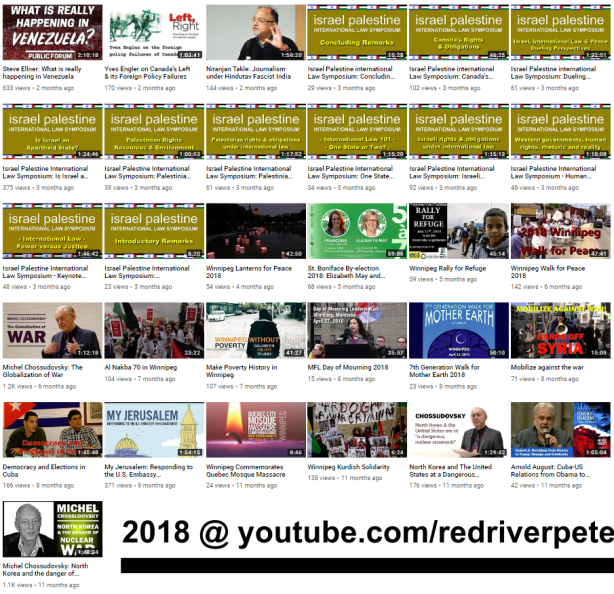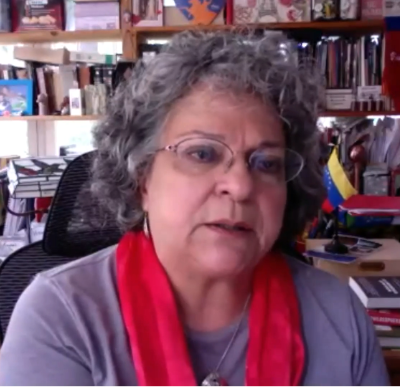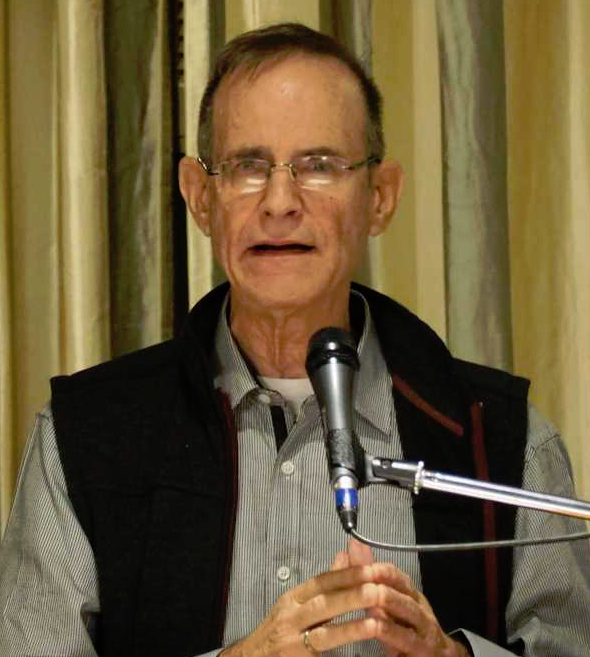
2018 was not my most prolific year in terms of video output, but it provided, nonetheless, some interesting and useful insights into the struggle for peace and human rights in various parts of the world. Here is a rundown of the past 12 months and as we like to say in YouTubeLand, if you enjoy any of these, please click the “like” icon and subscribe.
Steve Ellner: What is really happening in Venezuela: The Winnipeg Venezuela Peace Committee held a public forum on Friday, Oct. 19, 2018 entitled “What is really happening in Venezuela?” The forum featured Steve Ellner, professor of economics at the University of Oriente in Puerto La Cruz, Venezuela. Watch.
Yves Engler on Canada’s Left & its Foreign Policy Failures: Yves Engler discusses his latest book, “Left, Right — Marching to the Beat of Imperial Canada.” The book details the failure of Canada’s Left parties, institutions and intellectuals to confront Canada’s support of empire and promotion of corporate interests abroad. Watch.
Niranjan Takle: Journalism under Hindutav Fascist India: Indian journalist Niranjan Takle recounts how the mainstream media in India ignored or refused to publish his report on the suspicious death of Judge Brijgopal Harkishan Loya. Watch.
Israel Palestine International Law Symposium: An impressive line-up of experts on human rights and international law gathered in Winnipeg for a weekend to explore various legal aspects of the Israel-Palestine situation. I recorded all of the sessions.
- Introduction: Symposium coordinator David Kattenburg explains the origins and purpose of the symposium.
- Human rights: Rhetoric vs Reality: Lawyer and journalist Dimitri Lascaris describes the failure of western governments to uphold the human rights of Palestinians.
- Keynote Address: Michael Lynk, who is the United Nations Rapporteur on the situation of human rights in the Occupied Palestinian Territory, explains how international law has largely been ignored or broken by Israel over the past several decades of its occupation of the Palestinian Territory.
- Israeli Rights and Obligations: Michael Lynk and Dimitri Lascaris explore different aspects of Israeli’s legal rights and obligations in the Occupied Palestinian Territory.
- One State or Two?: Professors Michael Lynk and Virginia Tilley speak to this issue.
- Palestinian Rights & Obligations: In this clip, we hear from human rights advocates Suha Jarrar and Jonathan Kuttab.
- Palestinian Rights to Resources: Suha Jarrar, a Palestinian human rights researcher and advocate, and currently the Environmental and Gender Policy Researcher at Al-Haq human rights organization in Ramallah, Palestine explains how Israeli companies illegally exploit resources in the Occupied Territories.
- Is Israel an Apartheid State?: In this clip, Virginia Tilley argues that Israel meets the legal definition of an apartheid state.
- Dueling Perspectives: In this clip, David Matas defends Israeli practices and policies with regard to the Occupied Palestinian Territories (OPT). Michael Lynk argues that Matas’s arguments are not supported by international law.
- Canada’s Rights and Obligations: Dimitri Lascaris explains how Canada has not lived up to its obligations under international law.
- Concluding Remarks: In this final clip from the symposium, we hear from David Kattenburg, Mark Golden and Dean Peachey, key organizers of the event. The symposium was sponsored by (alphabetical order): Independent Jewish Voices Canada, Mennonite Church Manitoba Working Group on Palestine-Israel, Palestinian Canadian Congress, Peace Alliance Winnipeg, United Jewish People’s Order (Winnipeg) and the Winnipeg Centre Federal Green Party Association. Additional information, including Power Point presentations and other documents will be made available at the conference web site.
Winnipeg Lanterns for Peace 2018: Every August, Winnipeggers commemorate the 1945 atomic bombings of Hiroshima (Aug. 6) and Nagasaki (Aug. 9) with a Lantern Ceremony in Memorial Park. We believe it is important to keep the memory of those horrible events alive so that current generations understand we must never allow nuclear weapons to be used again. Watch.
St. Boniface By-election 2018 – Elizabeth May and Françoise Therrien Vrignon: Françoise Therrien Vrignon was the Green Party of Manitoba candidate in the July 17th Manitoba by-election in St. Boniface. With her in this video is Green Party of Canada leader Elizabeth May. Their discussion took place at La Maison des artistes visuels. Watch.
Winnipeg Rally for Refuge: The Canadians Care Coalition in association with Amnesty International, Menno Simons Students Association and the Global College Students Association held a rally entitled “Rally for Refuge: Rescind the safe third country agreement.” The coalition demanded that the Canadian Government rescind the designation of ‘Safe Third Country’ that is applied to the United States because the US is demonstrably unsafe for refugees. The Safe Third Country Agreement denies refugee claimants access to the Canadian refugee determination system if they have come from the United States to the Canadian border. Watch.
Winnipeg Walk for Peace 2018: Winnipeggers held their 37th Annual Winnipeg Walk for Peace. Sponsors: Peace Alliance Winnipeg and the Winnipeg chapter of the Council of Canadians. Watch.
Michel Chossudovsky – The Globalization of War: The Regina Peace Council played host to Professor Michel Chossudovsky, who spoke on the growing dangers of world war and the need to revitalize the peace movement. Professor Chossudovsky is the founder and director of Global Research. Watch.
Al Nakba 70 in Winnipeg: Winnipeggers marked the 70th anniversary of the forcible expulsion of Palestinians from their land and expressed solidarity with the people of Gaza who are under Israeli siege. Watch.
Make Poverty History in Winnipeg: Make Poverty History Manitoba released a comprehensive report on the poverty that affects one in ten Winnipeggers and called on the city’s mayor, Brian Bowman, to take the lead in developing a poverty reduction strategy for the city. Watch.
MFL Day of Mourning 2018: Manitoba’s labour movement held its annual observance in memory of injured and killed workers. Hundreds attended the march from the Union Centre to Memorial Park and the future site of the Firefighters, Peace Officers and Workers Memorial. Watch.
7th Generation Walk for Mother Earth 2018: Winnipeggers marked 15 years of taking to the streets with grassroots land and water defenders.The 7th Generation Walk is alternative to Earth Day, recognizing the resistance and resilience of Indigenous community led campaigns for social and environmental justice. Watch.
Mobilize against the war: Just hours before the United States launched missile attacks on Damascus and Homs, peace activists rallied outside the building housing the US Consulate to speak out against the war and Trump’s declared plan to expand it. The picket was organized by the Manitoba Peace Council. Watch.
Democracy and Elections in Cuba: Two Cuban government representatives visited Winnipeg to discuss Cuba’s electoral system and other issues of interest. The forum was sponsored by the Manitoba-Cuba Solidarity Committee. Watch.
My Jerusalem – Responding to the U.S. Embassy Announcement: Panelists representing Judaism, Christianity and Islam, share their personal reflections on what Jerusalem means to them and the implications of the US announcement to move it’s embassy there. Watch.
Winnipeg Commemorates Quebec Mosque Massacre: Winnipeggers gathered at the Manitoba Legislature to honour the victims of the terrorist attack on the Centre Culturel Islamique de Québec. Watch.
Winnipeg Kurdish Solidarity: In Winnipeg, the Kurdish community rallied at the Canadian Museum for Human Rights in defense of Kurds under Turkish attack in Afrin, Syria. Watch.
North Korea and The United States at a Dangerous Nuclear Crossroads: Michel Chossudovsky is professor emeritus at the University of Ottawa and founder of the Centre for Research on Globalization. He spoke at the University of Manitoba on the history of the United States’ conflict with North Korea and the prospects for nuclear war. Watch. As well, he spoke at the University of Winnipeg. Watch.
Arnold August – Cuba-US Relations from Obama to Trump: On a national tour to promote his book “Cuba-US Relations: Obama and Beyond,” Arnold August spoke at McNally Robinson Books on developments in the two countries relations since the election of Donald Trump. Watch.
That’s it for 2018. Happy New Year, all!












